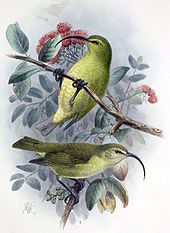| Lesser ʻakialoa | |
|---|---|

| |
| Specimen | |
| Conservation status | |
 Extinct (1940) (IUCN 3.1) | |
 Presumed Extinct (1940) (NatureServe) | |
| Scientific classification | |
| Domain: | Eukaryota |
| Kingdom: | Animalia |
| Phylum: | Chordata |
| Class: | Aves |
| Order: | Passeriformes |
| Family: | Fringillidae |
| Subfamily: | Carduelinae |
| Genus: | †Akialoa |
| Species: | †A. obscura |
| Binomial name | |
| †Akialoa obscura (JF Gmelin, 1788) | |
| Synonyms | |
|
Hemignathus obscurus | |
The lesser ʻakialoa (Akialoa obscura) is an extinct species of Hawaiian honeycreeper in the subfamily Carduelinae of the family Fringillidae. It was endemic to the island of Hawaiʻi. It became extinct due to habitat loss and disappeared at around the same time as its Oʻahu relative.
Description

It was a yellowish bird with a two-inch-long thin whitish-yellow bill. It had small olive green wings which it used to flit from tree to tree to look for insects like beetles and caterpillars.
Behavior
It was seen gleaning the trees in search of insects. The bill of the akialoa was also designed for more than bug extraction. The akialoa also fed on nectar in the flowers of lobeliads and o’hia blossoms. Its long bill could easily fit into petals of long flowers and took pollen from flower to flower on its forehead. It was collected at several places. It was once thought to be the same species as the Maui and Oahu form, but when specimens were compared all together the scientist saw that all three were different species.
Extinction
With the loss of the trees and the flowers it depended on, the bird had no shelter or food and disappeared in 1940.
References
- ^ BirdLife International (2017). "Akialoa obscura". IUCN Red List of Threatened Species. 2017: e.T22728910A119550231. doi:10.2305/IUCN.UK.2017-3.RLTS.T22728910A119550231.en. Retrieved 11 November 2021.
- "Akialoa obscura. NatureServe Explorer 2.0". Retrieved 1 May 2023.
External links
- 3D view of specimens RMNH 110.013 and RMNH 110.014 at Naturalis, Leiden (requires QuickTime browser plugin)
This Fringillidae-related article is a stub. You can help Misplaced Pages by expanding it. |